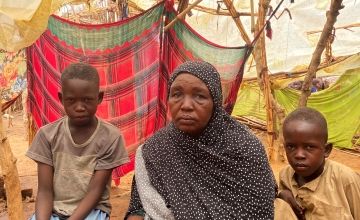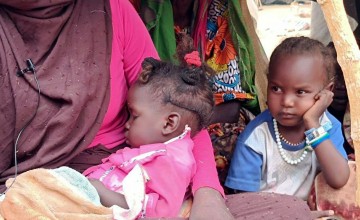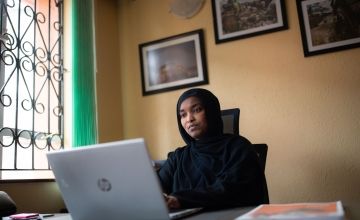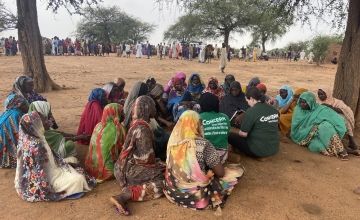
Read our 2023 annual report

Knowledge Hub
As thousands of people continue to flee violence in Sudan and cross the border into Chad, Concern’s Amina Abdulla has called the crisis the worst she has ever seen in 20 years as a humanitarian.
More than 2.6 million people have been displaced within Sudan since violence broke out in mid-April, while 757,000 people have crossed borders into neighbouring countries as of mid-July.
In Chad, the estimated number of new refugees is currently at around 230,000 but this is increasing all the time, with thousands more on the Sudan side of the border looking to escape violence in the Darfur region, located in western Sudan.
“This is the worst crisis I’ve ever come across,” says Amina Abdulla, Concern’s Regional Director for the Horn of Africa, citing massive difficulties in getting humanitarian aid to those that need it the most.
“Over the last 20 years of my career in the sector I haven’t seen this level of displacement happen over just eight weeks.”
Where is the international community in all of this?
Amina believes that, following an initial flurry of media coverage in the initial weeks of the conflict, the international community has turned its gaze away from events in Sudan and its bordering countries, to the detriment of those in need of vital supplies and medical intervention.
It is her belief that generations to come will be profoundly affected by what has happened in recent months, and the bloodshed that continues to happen.
“I think the international community has a very short attention span,” she adds.
“This is mostly driven by media; the Sudan crisis lasted on major news outlets for about three weeks.

“When different countries were struggling with the evacuation of their citizens from Sudan, thereafter there has been very minimal coverage on the humanitarian impact of this crisis and the needs of those affected.
“I think that’s unfortunate because of just how this crisis has played out, the level of displacement we have seen, and the impact of it not just in the present, but into the future as well.
“The level of unemployment (that was already there before the start of the violence), levels of poverty, high levels of malnutrition, the effects of climate change on the country - if we don’t get a handle on this crisis, opportunities for generations to come will be lost.”
Concern’s work on the Chad-Sudan border
Concern’s work on the Chad side of the border is focused on Sila province, where 47,280 refugees are currently situated in transit camps and in need of health interventions, food, shelter kits and other essential items and services.
We have been assessing the situation in Addemour camp, on the border with Sudan, where refugees are arriving before relocating to new or existing camps in Eastern Chad.
Our mobile health and nutrition clinic has been providing essential health services free of charge to both the refugee and host populations, treating moderate and severe cases of malnutrition and offering prenatal and postnatal consultations, curative health services and vaccination services to those who need them.
We are also implementing a response in the Zabout camp, and hope to do likewise in the Djabal and Goz Amir camps.

More than 90% of people in the camps are women and children, and we have been distributing NFI (non-food items) kits in the Zaboud camp, while - under Irish Aid funding - we have also procured shelter materials and are awaiting delivery before transferring these to the UNHCR (United Nations High Commissioner for Refugees and their local partner ADES to support the construction of new shelters.
“People are arriving with very little, and with a lot of trauma,” says Reka Sztopa, Concern’s Regional Director for West Africa and Sahel.
“Most of the people arriving are women and children, and some are crossing the border with gunshot wounds and other injuries.
There are officially almost 192,473 refugees who have been registered in Chad, and the prediction is that it may go as high as 250,000 by the end of the summer.”
Any hope of returning home is non-existent, as things stand.
“In the short term it would be very difficult for them to return due to the nature of the conflict,” adds Reka, who is hoping to see additional funding for Concern’s work in the region and an escalation in our response.
“This is unfortunately likely to be a protracted crisis, though of course we all wish for an end to hostilities and the conditions put in place for people to return.”
“A crisis on top of a crisis”

While conflict is at the root of the current displacement of millions of Sudanese people, another factor is about to come into play that will only exacerbate the difficulties in getting crucial aid to those that need it.
Namely, the weather.
“We are getting into the rainy season, and this is a context where infrastructure is at a bare minimum [before you take climate considerations on board],” Amina Abdulla warns.
“Roads are soon going to be impassable and we will have to deal with an additional level of displacement caused by flooding. A crisis on top of a crisis.”
Tribal rivalries are also being stoked by the two main factions at the heart of the conflict, and this is a situation that is threatening to spill over from the Darfur region to other parts of Sudan.
“There is the conflict between the two principles but there is also a tribal element coming into it,” adds Amina.
“It’s playing out in the Darfurs, and it’s going to be playing out in other regions as well if the two parties don’t come to some sort of agreement."
A call for action
As we continue our efforts to provide aid in West Darfur and in West and South Kordofan - in the southern part of Sudan - we are urging all major donors worldwide to increase funding and support to support a humanitarian situation that is going from a crisis to a catastrophe.

We are currently providing non-food items, dignity kits that include blankets, pots, mosquito nets and sanitary towels, as well as mobile health services where we can.
However, widening the coverage of our response - as well as the responses of other humanitarian organisations in the region - is essential in order to prevent an already volatile situation from getting worse.
Our impact in 2023
people reached through our emergency response
people reached through our health interventions
people reached through our livelihoods programmes




